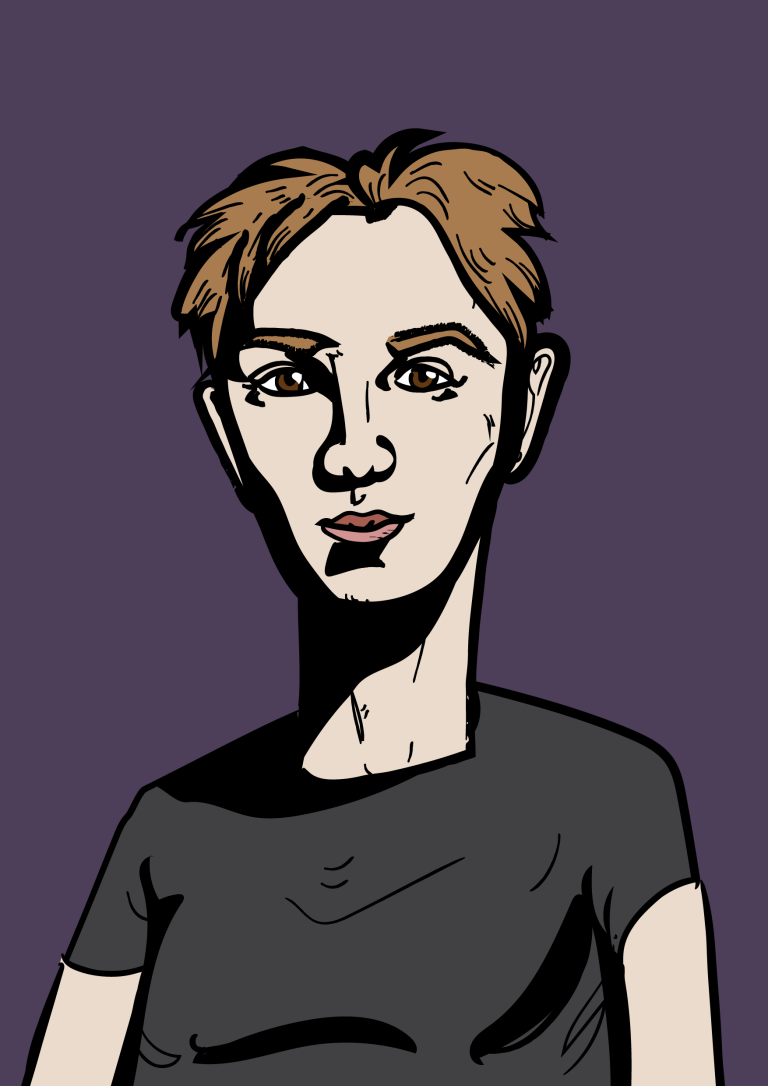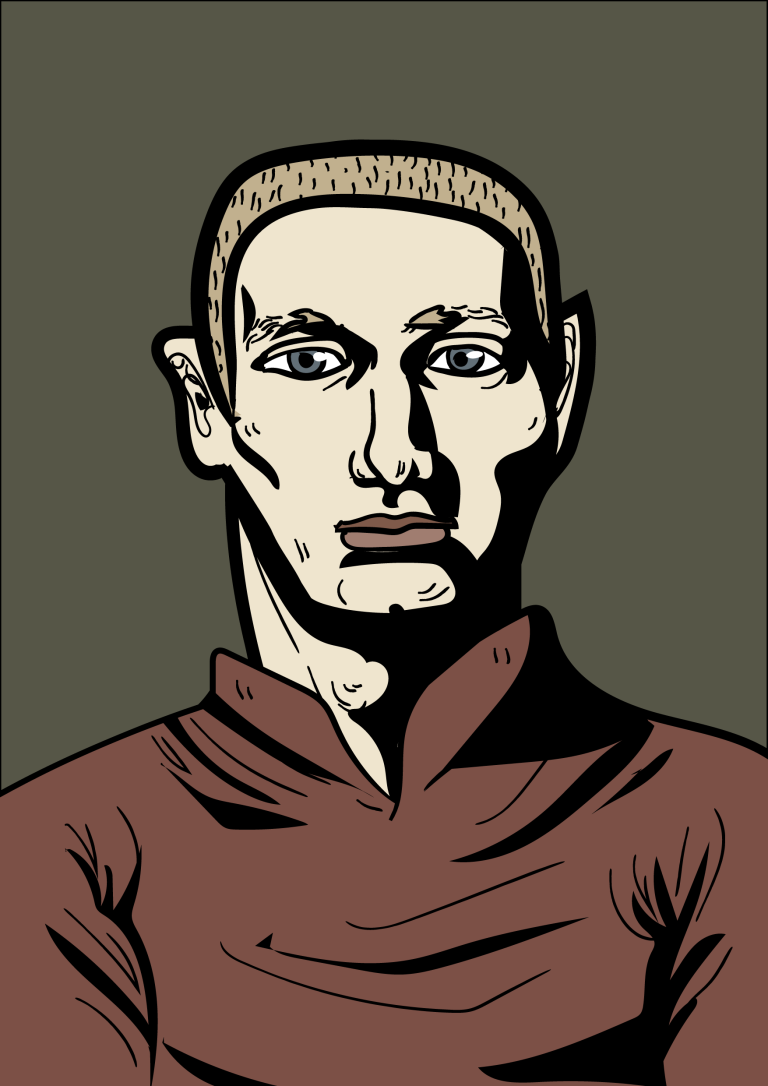
I am 42 years old, I am a lesbian. I have a wife, also Katya, she and I are originally from Odesa, and now we are together in Spain.
We had a great time on the last day before the full-scale invasion. We went to a hen party: our friends had got married in Denmark, and we celebrated it. The party was at a wine shop. We drank, laughed, danced. So when my friend Tanya called me at five in the morning shouting “The war has begun!”, we were dumbfounded. I immediately started crying, even became hysterical: I had no doubt that it was true. Why did I immediately believe it? Because another friend of mine, Khrystyna, told us about a week before the full-scale war that her parents who lived in Horlivka said that there were a lot of soldiers and military equipment around the city, and in general the situation there was very dangerous. Of course, we were worried, but we were like “Oh, what a pity” and couldn’t even imagine that this would ever happen to us.
Overall, I didn’t expect such a rapid and violent development of events. I can honestly say: for two or three years of ATO (Anti-Terrorist Operation) I hadn’t perceived anything that had been happening in Donbas since 2014 as something real. Sometimes I’d even forgotten about it. However, the personal stories of my internally displaced friends from Donbas made me think about the fact that Donbas wasn’t so far away.
When I reminisce about the spring of 2022, I realize that I don’t remember at all what I dreamed about then, what I planned. The only thing that I can recall is that Katya and I had tickets for a cruise on the Mediterranean Sea, we were waiting for Covid to somehow settle down so that we could go. But now all this seems like a different life, because the war changes everything. You simply forget about your life before, the brain methodically and systematically deletes it.
The first days of the full-scale war I was drinking, crying and monitoring the news. Well, and trying to persuade Katya to leave at the first chance. I started persuading her to leave almost from the first hour of the war. She didn’t dare to leave for a long time because her parents were old, it was hard to make them go anywhere. Understandably. But later when at a certain point leaving became a matter of survival, I told her: “Of course, I understand everything, but my safety is more important to me. If you can’t go now, let me go and then we’ll meet somewhere in Poland or Moldova.”
When the initial shock passed, we started a tradition: every morning we went out to Oleksandrivskyi Avenue to drink coffee and share the night’s experiences. It seemed that half the people that stayed in Odesa gathered there. Despite my own condition, I tried to be useful. I remember at the end of the first week my friends and I agreed to go make Molotov cocktails. While we were walking, we saw a tank on the street with young guys standing next to it. To be honest, until that time we had seen military equipment, anti-tank hedgehogs and sandbag fortifications only in the movies. And this wasn’t a movie, this was real life. It was really scary. I was really touched by all that, burst into tears, took out a yellow and blue ribbon from my bag and shouted “We will win!!” – the soldiers smiled, and a minute later there was an explosion above us. We were terrified, to put it mildly. We didn’t know what to do. The soldiers started running somewhere, then stayed near the wall…
I couldn’t live in such conditions. We agreed to go to Poland. But it was also scary: Katya was worried that we might not have enough gas, she was worried that we might end up somewhere in the middle of the fields, she was worried that we wouldn’t be able to buy fuel at gas stations because it had already been sold out… In the end, we took one suitcase and sleeping bags – in case we had to spend the night “in the field”. Also just in case, we bought another petrol canister. I now understand that those five litres wouldn’t have saved us in any case.
Nevertheless, everything went quite well. From Odesa, we drove to Bilhorod-Dnistrovs’kyi, spent the night there with an acquaintance, and at five in the morning the next day we went to the border. Despite all the quarrelling, as it turned out, Katya had been monitoring the forums looking for the shortest and easiest way to leave. And we managed to do it: for the entire time that we were driving, we spent only about an hour in traffic jams. It could easily have been a few days like it happened to others.
We left Ukraine for Moldova. And I’ll remember for the rest of my life how we were drinking coffee at a gas station and a local woman growled in our direction: “Look at these Ukrainians! Came here running like rats.” At that moment I understood that we wouldn’t be welcome anywhere. Because we were running away from the war, the locals, although they understood the whole deal, still didn’t want to suffer because of it. And I also understood another thing: while in Ukraine we could stay with friends or acquaintances, in Europe you have to pay for everything. And also pay European prices. And the budget was limited, so we wouldn’t be able to live as we used to in Ukraine. So I started looking for places where we could stay temporarily or pay a nominal fee. The LGBT organization GAU (Gay Alliance Ukraine) helped us a lot with this. I couldn’t tell you how often we saw news from Ukraine on TV in various cafes along the way. Imagine: explosions on the screen, bombed-out cities. And people are sitting, drinking coffee, talking about something pleasant… Only later did we realize that if you suffer from war, it doesn’t mean everyone else does. The pain from the news was as if your whole jaw had been pulled out, not just one tooth. And no one was forced to help and sympathize with you because people had their own lives.
We travelled half of Europe in half a year. After Moldova, there was Romania, and after it – Hungary. There we stayed in the house of a man from America. In addition to us, three other guys from Ukraine lived there. Katya and I slept on a single child’s bed – heads in opposite directions. And it was then that we felt like refugees, refugees in a bad sense of the word. Without a home, without rights. Where to go, what to do? You had to read a lot of forums, compare information… But we went through small border checkpoints, no one met us there, no one gave us an apartment, no one helped us adapt.
We were at pride marches in Munich, Berlin, visited the south of France, Italy, went to Poland, Slovakia and Slovenia and reached the north of Europe – Finland, Estonia and Latvia.
We are now in Spain. And although it is beautiful here, I still miss Ukraine. Home is home. The mentality of people here is different, the food is different, everything is different. But despite everything, we try to help somehow. In Germany, we took part in a rally that demanded to close the sky over Ukraine. It was very touching, many of the participants cried. In Spain, we went to rallies at the local town hall and took part in a rally on cars. We try to go to all the events in support of Ukraine. The world needs to see: this horror and grief still hasn’t gone anywhere. However, it often annoys the locals. More than once I heard something like “No one wants you here” in my direction. It really hurts a lot. Perhaps this is another factor in favour of returning with Katya after the war. Still, there were moments when I felt very happy here. For example, when we found and rented our house, when we got married with Katya.
I believe that after the victory when the people will have returned to Ukraine from Europe, it will have a positive effect on society’s attitude towards LGBT people. Because during the time spent in democratic countries people will learn that sexual orientation other than heterosexual is normal. But for now we are waiting for the victory. I hope that it’s already close.



